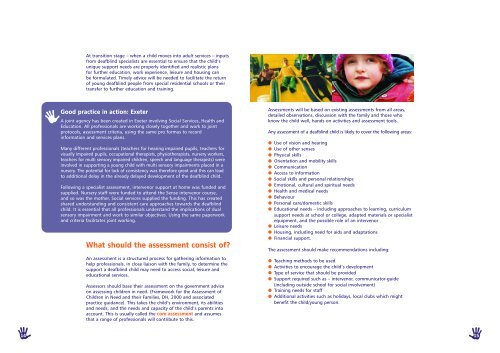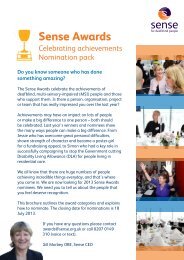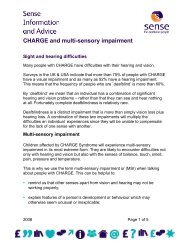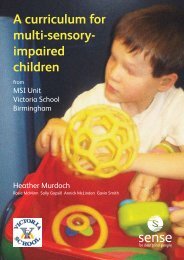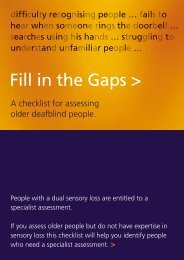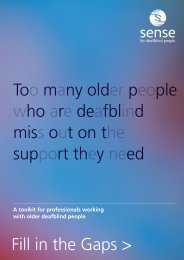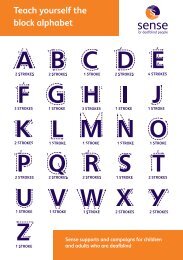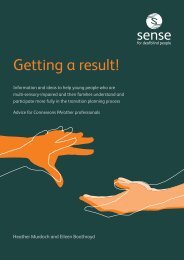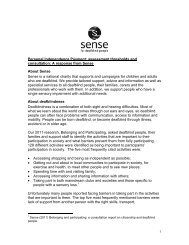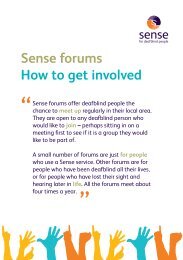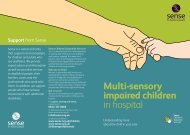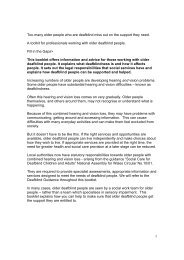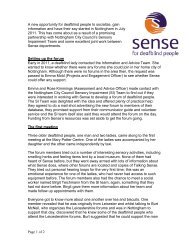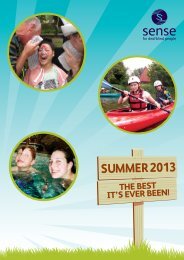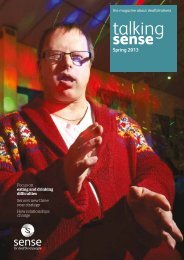A toolkit for deafblind children's services reaching out ... - Sense
A toolkit for deafblind children's services reaching out ... - Sense
A toolkit for deafblind children's services reaching out ... - Sense
Create successful ePaper yourself
Turn your PDF publications into a flip-book with our unique Google optimized e-Paper software.
At transition stage – when a child moves into adult <strong>services</strong> – inputs<br />
from <strong>deafblind</strong> specialists are essential to ensure that the child’s<br />
unique support needs are properly identified and realistic plans<br />
<strong>for</strong> further education, work experience, leisure and housing can<br />
be <strong>for</strong>mulated. Timely advice will be needed to facilitate the return<br />
of young <strong>deafblind</strong> people from special residential schools or their<br />
transfer to further education and training.<br />
Good practice in action: Exeter<br />
A joint agency has been created in Exeter involving Social Services, Health and<br />
Education. All professionals are working closely together and work to joint<br />
protocols, assessment criteria, using the same pro <strong>for</strong>mas to record<br />
in<strong>for</strong>mation and <strong>services</strong> plans.<br />
Many different professionals (teachers <strong>for</strong> hearing impaired pupils, teachers <strong>for</strong><br />
visually impaired pupils, occupational therapists, physiotherapists, nursery workers,<br />
teachers <strong>for</strong> multi sensory impaired children, speech and language therapists) were<br />
involved in supporting a young child with multi sensory impairments placed in a<br />
nursery. The potential <strong>for</strong> lack of consistency was there<strong>for</strong>e great and this can lead<br />
to additional delay in the already delayed development of the <strong>deafblind</strong> child.<br />
Following a specialist assessment, intervenor support at home was funded and<br />
supplied. Nursery staff were funded to attend the <strong>Sense</strong> intervenor course,<br />
and so was the mother. Social <strong>services</strong> supplied the funding. This has created<br />
shared understanding and consistent care approaches towards the <strong>deafblind</strong><br />
child. It is essential that all professionals understand the implications of dual<br />
sensory impairment and work to similar objectives. Using the same paperwork<br />
and criteria facilitates joint working.<br />
What should the assessment consist of?<br />
An assessment is a structured process <strong>for</strong> gathering in<strong>for</strong>mation to<br />
help professionals, in close liaison with the family, to determine the<br />
support a <strong>deafblind</strong> child may need to access social, leisure and<br />
educational <strong>services</strong>.<br />
Assessors should base their assessment on the government advice<br />
on assessing children in need. (Framework <strong>for</strong> the Assessment of<br />
Children in Need and their Families, DH, 2000 and associated<br />
practice guidance). This takes the child’s environment, its abilities<br />
and needs, and the needs and capacity of the child’s parents into<br />
account. This is usually called the core assessment and assumes<br />
that a range of professionals will contribute to this.<br />
Assessments will be based on existing assessments from all areas,<br />
detailed observations, discussion with the family and those who<br />
know the child well, hands on activities and assessment tools.<br />
Any assessment of a <strong>deafblind</strong> child is likely to cover the following areas:<br />
● Use of vision and hearing<br />
● Use of other senses<br />
● Physical skills<br />
● Orientation and mobility skills<br />
● Communication<br />
● Access to in<strong>for</strong>mation<br />
● Social skills and personal relationships<br />
● Emotional, cultural and spiritual needs<br />
● Health and medical needs<br />
● Behaviour<br />
● Personal care/domestic skills<br />
● Educational needs – including approaches to learning, curriculum<br />
support needs at school or college, adapted materials or specialist<br />
equipment, and the possible role of an intervenor<br />
● Leisure needs<br />
● Housing, including need <strong>for</strong> aids and adaptations<br />
● Financial support.<br />
The assessment should make recommendations including:<br />
● Teaching methods to be used<br />
● Activities to encourage the child’s development<br />
● Type of service that should be provided<br />
● Support required such as – intervenor, communicator-guide<br />
(including <strong>out</strong>side school <strong>for</strong> social involvement)<br />
● Training needs <strong>for</strong> staff<br />
● Additional activities such as holidays, local clubs which might<br />
benefit the child/young person.<br />
14 15


